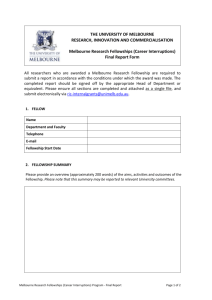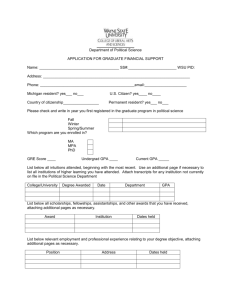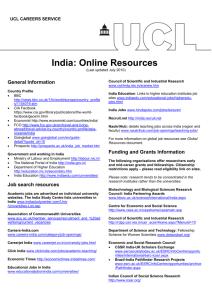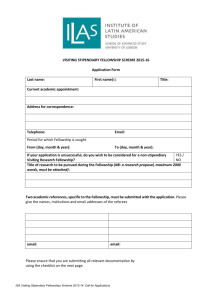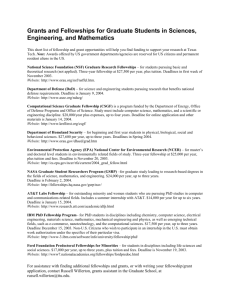Graduate Fellowship Information
advertisement
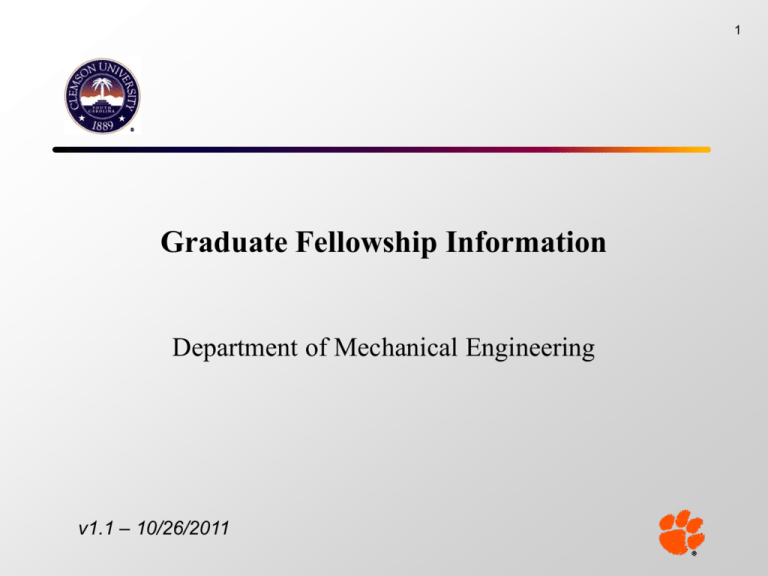
1 Graduate Fellowship Information Department of Mechanical Engineering v1.1 – 10/26/2011 2 Agenda • • • • • Who pays for your graduate education? How do they decide? What fellowships are available? What do I have to do to apply for a fellowship? Extra help Clemson offers • FAQs 3 Who Pays for your education? • • • • Your Employer The Department (GTA) Your Research Advisor (GRA) Fellowships (Government and / or private) Money is important, but it is also about the prestige 4 How people decide whether to pay for you? 1. 2. 3. 4. 5. 6. GPA GRE scores Biosketch/essay Interest in Ph.D. (M.S.) Letters of recommendation Specific field of interest To make a compelling case in items 3, 4, 5 and 6, research experience is particularly useful ! 5 What fellowships are available? • http://www.grad.clemson.edu/financial/FinancialAssistance.php • • • • • http://fellowships.gatech.edu/index.php?page=listataglance http://fellowships.gatech.edu/index.php?page=listgeneral http://opsf.byu.edu/Scholarships/SearchForms.aspx http://www.gdnet.ucla.edu/asis/grapes/search.asp http://fellowships.gatech.edu/index.php?page=resources 6 7 Available Fellowships (sample) • CoES Dean’s Scholars Program – • Graduate School Fellowship – • Twelve-month stipend of $30,000 plus $10,500 toward tuition expenses for three years of study. NASA Graduate Student Researchers Program – • Up to $15,000/year for top students National Science Foundation (NSF) Fellowship – • Primarily for Doctoral students ~ $15,000 for 3 years Fellowship value of $24,000. U.S. Department of Defense: National Defense Science & Engineering Fellowship Program – – Intended for Doctoral students Stipend: 1st Year $18,500, 2nd Year $19,500, 3rd/4th Year $20,500, plus invitation to do research at DoD labs during the summer 8 Available Fellowships (sample) • Fellowships for Minorities & Women – Ford Fellowship (Minorities) • http://national-academies.org/fellowships – GEM Fellowship (Minorities) • University Representative Dr. Robert Snelsire – Zonta International Foundation (Women in aerospace related engineering) • www.zonta.org – Lucent Technologies (Minorities & Women) • www.bell-labs.com/fellowships/CRFP 9 Federal Agencies, Programs, and Information (1) • • • • • • • • • • U.S. Air Force Research Office U.S. Army Research Office Catalog of Federal Domestic Assistance Centers for Disease Control and Prevention Congressionally Directed Medical Research Program Defense Advanced Research Projects Agency U.S. Environmental Protection Agency FedBizOpps.gov Federal Acquisition Jumpstation Federal Register • • • • • • • • • • Grants.gov Health & Human Services National Aeronautics and Space Administration National Endowment for the Arts National Endowment for the Humanities National Institutes of Health NIH Parent Announcements NIH Basic Behavior and Social Sciences National Oceanic and Atmospheric Administration National Institute of Standards and Technology 10 Federal Agencies, Programs, and Information (2) • • • • • • • • • • • • • Individual NOAA Offices National Science Foundation Office of Naval Research U.S. Department of Agriculture U.S. Department of Education U.S. Department of Energy Office of Science National Energy Technology Lab Office of Nuclear Energy Office of Energy Efficiency and Renewable Energy Advanced Research Projects Agency U.S. Department of Homeland Security U.S. Department of Housing and Urban Development NSF Graduate Fellowships • NSF has been planning to increase the investment into graduate fellowship • NSF has a dedicated website providing guidelines for application • Some portion of the guidelines can be useful for applying other graduate fellowships! just google “NSF fellowship” 12 What do I have to do to apply for a fellowship? • How/What to prepare – Plan of study – Experience – Motivation – Impact of your work 13 Fellowship application essays • • • • Plan of Research / Study Biosketch / Experience Motivation / Personal experiences Experiences – integrating research and education, – advancing diversity, and – contributing to your community 14 Your Plan of Study • Describe a project / research interest – Field in the discipline – Practical need – A specific problem • A plan for attacking the problem • Not stated but important: – Find an advisor! 15 Experience • Required – Describe your role in professional projects • Optional (but useful) – Describe what experience has prepared you for – Did your plan evolve from professional experiences? 16 Describing projects • Need / Problem – What was the project supposed to do or determine? • Tasks – What did you design? – What tests did you conduct? • Result – What was developed (or expected)? – What publications were issued (or projected)? 17 Personal, professional or educational experiences or situations • What do you bring to your colleagues? – What motivates you? – What experiences or interests do you bring to your work? – What might people learn from you? 18 Research & education, diversity, community • What have you done (or will you do) for others? – Teaching? Judging science fairs? – Inviting others to participate? – Professional activities, Campus activities, Civic activities? 19 References--1 • How people invest in you! – University Faculty (strongly preferred) – Professional supervisors (when qualified) – Faculty at other schools (when available) • They must understand your plans and interests 20 References--2 • To write a supportive letter, faculty members need: – – – – Your resume Your plan Your biosketch / experience Your time and enthusiasm a warm and fuzzy letter is easy – and often useless (john is a hard-working student, he has a GPA of 3.9, he pays attention to details, he has an interest in xx subject, bla bla bla, …) a compelling letter is difficult – but it is entirely up to yourself (I have personally seen john’s growth in both academic study and research in the last three years. With keen interest, he independently invented a new algorithm to perform ABC. His hard work paid off as leading authors two journal papers and one conference presentations. … What impressed me the most is his determination when challenged with tough problems, for example, … ) 21 References--3 • How they invest in you: – – – – Letters (commonly for several years) Feedback on your plan Information about schools and potential advisors A professional network Extra Help Clemson Offers google “NSF fellowship Clemson Workshop” three sessions of workshops guiding you through the entire process of application! 23 FREQUENTLY ASKED QUESTIONS 24 1. What is a fellowship? Are they different from scholarships? • A fellowship is a monetary award usually designated for graduate students, and many are nationally competitive. There are often specific requirements and expectations, and some fellowships are limited to particular fields of study. Students applying for fellowships should read carefully the requirements (usually on the fellowship web site) before applying to be certain they have the qualifications to apply for the award. Scholarships may be either for undergraduate or graduate students, and students need to check qualifications carefully to choose awards for which they are most qualified. 25 2. How can I decide if I am competitive for a fellowship or scholarship? • Competitive students are generally those who achieve high grades and have potential to make significant contributions for the public good. How high grades should be vary with different competitions, and students should read the web site for the award to determine if there is a specific GPA requirement. In addition to grades, there are other assets most reviewers consider: – – – – – meaningful volunteer experience, honors courses, undergraduate research, study abroad, and leadership in campus and community activities. 26 3. Is there an easy way for me to find award web sites other than searching for each one on Google? • See provided links. 27 4. I am an undergrad. Is it too early for me to be thinking about fellowships? • Freshman year as a undergrad is not too early to begin planning future applications. Talk with advisors about how to achieve experiences that will make you a competitive candidate for future applications. 28 5. I am not sure my grades and activities are competitive. Should I bother applying even when I am not sure I can compete nationwide? • Going through an application process is hard work, but it is the kind of hard work that is rewarding in many ways. Applicants get to know themselves and their goals by the writing they do, and they develop skills, such as interviewing and grant writing, they will use in the future. Polishing your writing skills is never a waste of time. The personalized mentoring from Fellowship Communication Program advisors is valuable and helps you know where to use your energy. Rhodes and Marshall require 3.7 or above GPA. Discuss with advisors your situation for other programs. You may have accomplishments that will help a lower GPA. 29 6. I want to apply for an external fellowship but am not sure if my essays are what they should be. Is there anyone who can help? • Speak with your advisor or graduate chair for guidance. 30 7. Are fellowships taxable? • Under the Tax Reform Act of 1986, most fellowship funding is considered taxable income, but sometimes there are portions of funds that may be deductible. Consult an accountant about how to declare funds, and read carefully Chapter 1 of IRS publication 970, Tax Benefits for Education. 31 8. I know reference letters are important, but I am uncertain about how to ask for them. What do you recommend? • The best recommendations come from faculty in courses where you have done well and the professor knows you. It is helpful to ask if the person can provide you with a strong recommendation. If the professor says no or is unsure, it is better to learn this information at the beginning and ask someone else than to have a lukewarm recommendation. Throughout your college career, get to know professors so your abilities are known. Materials to provide referees include the following: – – – – – – • A cover sheet with your name, address, phone, and email information, purpose of the recommendation (graduate school or fellowship application); A copy of your personal statement or proposal; A list of course(s) you had with this person, grade, and semester and any special projects you did; Your overall GPA and unofficial copy of transcript; The date when the recommendation is due, the address where the letter is to go, and whether the letter is to be submitted online or in hard copy; If there are special requirements (in a sealed envelope signed across the seal or other direction), provide this information. Do not ask recommenders at the last minute. Plan your applications and ask many weeks in advance. Check with those who are writing shortly before letters are due to be certain all materials have been submitted. Be considerate and write a thank you note to those who provide you references. 32 9. Can I decide to apply for a fellowship on my own? Do I need to go through Clemson? • Many national scholarships require an institutional endorsement. For these awards students must apply through the Fellowships Office. Some awards limit the number of students who may be nominated from each university. Talk with an advisor so that you know about the endorsement process and if only a limited number may be recommended. • NSF, NDSEG, Hertz, and many other applications are submitted by the individual and not through the Fellowships Office. However, with all applications, you will benefit from feedback about your essays from a Clemson faculty and staff. 33 Process • • • • Search for fellowships. Develop a plan, what is due, when they are due. Write essays and acquire required information. Ask for letter of recommendation (3 weeks before due, remind with 1.5 weeks left, remind 3 days) • Thank letter writers.
